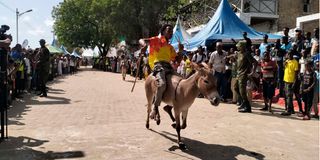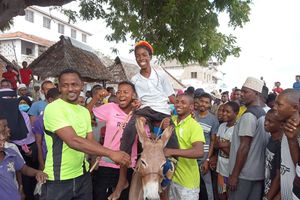
Participants take part in the donkey race competition during the Lamu Cultural Festivals on December 1, 2023.
From a spectator's perspective, a donkey race may seem to be a unique and fun sport. One does not expect the race to take a toll on the riders easily.
What is mostly seen during a race is riders controlling the speed and direction of the donkey, and not a rider fainting during a competition or after getting to the finishing line.
In Lamu County, festivals in the archipelago such as the Lamu Cultural Fete, Maulid, Lamu Food and Expo Festival are not complete without the famous donkey race competition as part of the entertainment for revellers.
It is popular with tourists and fun lovers from around the globe who attend the numerous annual cultural events on offer in Lamu County.
At the end of a race, the winners are crowned and the owners of the donkeys receive handsome rewards in cash and trophies, among other gifts.

Locals take part in the Donkey Race Competition during Lamu Cultural Festivals on November 30, 2024.
However, on the flip side, it has not been all rosy during such competitions. Some donkey riders faint during or after races.
First aid providers and paramedics are often on standby in case this happens.
Some Lamu residents interviewed by Nation.Africa attributed the fainting of the riders to lack of experience.
Experienced donkey rider Fahmi Abdulrahman Chapa said beginners in such contests are more prone to motion sickness which, subsequently leads to fainting.
Mr Chapa, who is also the chairperson of the Lamu Donkey Owners Association, said that lately, participants have not been making adequate preparations despite lacking experience.
“In recent years, we’ve seen riders struggling to train just a few days before competitions, yet newcomers and beginners are prone to motion sickness when they try to control the movement of donkeys. Some run out of energy and are unable to even complete races,” he said.
Another experienced racer, Swaleh Bunga, said that environmental factors and the distance covered by riders can also cause riders to faint. He said that previously the distance was shorter compared to the races being organised lately.
Mr Bunga also said that donkey races have continued to attract more competitors compared to earlier years when donkey racing was introduced for the first time on the island. This, he said, has reduced the space available for racing.
“You can imagine riding in a confined space due to many spectators or onlookers. Many times such environments exacerbate feelings of nausea that results in individuals collapsing or fainting,” said Mr Bunga.

Locals participate in the Donkey Race Competition during Lamu Cultural Festivals on December 2, 2023.
He added: “In the olden days, the race would start in front of the Lamu Donkey Sanctuary up to KenGen area and back which is about 500 metres. Today, the same contest has been extended up to King Fahd Hospital and back to the Donkey Sanctuary, a distance of about 1km. That’s tough for some competitors.”
Donkey race coach Ahmed Athman said Lamu has in recent times witnessed extremely hot weather — a situation that could work to the disadvantage of some participants.
“Dehydration has become the most common problem affecting donkey racers in recent days due to the hot temperatures. That’s why the 2024 Lamu Cultural Festival Donkey Race registered the highest number of participants who fainted during or shortly after finishing the race,” said Mr Athman.
Five participants out of the 11 who lined up for the finals fainted during the event.
Donkey racer Mohamed Omar has called on organisers to consider providing glucose for riders to energise them and boost their performance during the races.
Medics have linked the fainting of riders to various factors.
Lamu County Health Executive Dr Mbarak Bahjaj cited dehydration as part of the reasons behind the racers’ fainting during competitions.
“Incidences of racers fainting occur mostly due to dehydration. Other times, it could just be as a result of sheer tension or over-excitement which leads to vasovagal shock,” said Dr Bahjaj.
He, however, assures donkey race lovers that there is no cause for alarm.
Dr Duncan Amani Chai of the Blunile Mkoroshoni Medical Centre in Kilifi County said fainting among donkey racers is possibly caused by motion sickness while riding.
“It’s normal for one to experience motion sickness while riding a donkey or a horse. This is because the donkey’s or horse’s movement can create a feeling of motion that some people may find disorienting, especially if they are not used to the motion or if the animals are moving in a particularly bumpy or erratic manner,” said Dr Chai.
He advised participants to always stay hydrated and avoid heavy meals before riding for their comfort.
The medic said every person has their degree of sensitivity, some people are more sensitive to motion sickness than others.
“One can start with shorter rides to acclimatise their bodies to the motion. They can, as well, focus on the horizon rather than the ground to help maintain their balance while riding a donkey,” he said.











